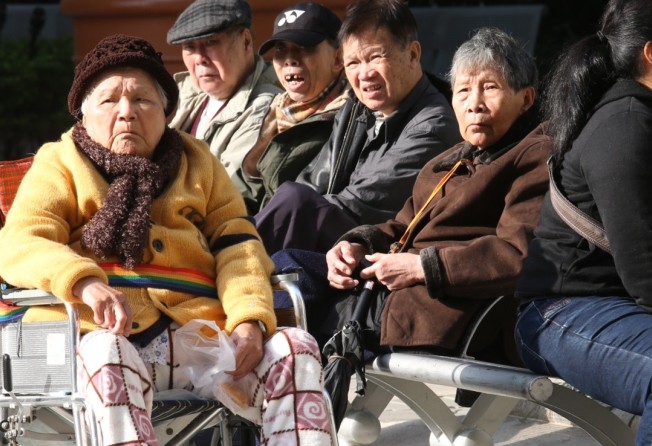Letters to the Editor, November 26, 2017

A universal pension can aid carer scheme
I agree with the suggestion that the elderly in Hong Kong should be given more support, especially in winter and given their heavy use of hospital services.
Using domestic workers sounds good but there are a lot of issues to be considered (“Domestic helper subsidy ‘seriously considered’ for low-income elderly singles in Hong Kong”, November 6).
The devil in the proposal lies, as always with ideas, in the detail of application.
The well-researched proposal for a universal pension by Professor Nelson Chow Wing-sun could offer considerable help to many people usually falling outside the government’s “helped” category in paying for the care obtained.
The care could be feasible as it could be well supervised by a family member.
Single elderly are a different matter. Some elderly may be confused, be in different stages of memory loss or dementia as well as needing the type of personal care provided by trained personnel, assistance with bed baths, prevention of bedsores as well as physical activities suitable to keep the elderly person as fit and well as possible.
We have a basic model for reference in the home help service offered by some NGOs.
It would be difficult work for an untrained, unsupervised helper, including caring overnight alone, without the backup nurses have in hospital.
Domestic workers may tell you how often they are accused by a confused elderly person of stealing whereas an item may exist in memory only or be temporarily moved.
A family member accused can better handle this kind of common accusation.
Supervision, in-depth training, and reasonable pay and working conditions are essential, as is communication (that is, language) and external support, when needed, from community doctors, nurses and social workers.
Tom Mulvey, Wan Chai
Wholesale ban on dogs in flats is unacceptable
I echo Joan Miyaoka’s comments on the ban on keeping dogs in some residential buildings (“Dog-owning ban on estates needs a rethink”, November 18).
A deed of mutual covenant is supposed to be a legal document to put everything in words so that every owner in the building feels they are being treated fairly.
This ensures a harmonious living environment.
I have three dogs and would feel offended and that my rights were being violated if I could not keep them in my home.
I agree that some pet owners are irresponsible ignoring basic hygiene rules, but that cannot justify an outright ban on keeping dogs in estates.
Joseph Solomon Leung, North Point
Government not just jailing cybercriminals
The central government has targeted people selling virtual private networks (VPNs) which are used by citizens to evade the “Great Firewall”.
Major internet sites like Facebook, Twitter and YouTube had already been shut down, and earlier this year, the government moved on VPNs. It is concerned about mainland citizens having access to news sites containing material critical of the Communist Party. One man was jailed for selling VPNs and the internet crackdown continues (“Skype taken off shelves in latest cyber blitz”, November 23).
Some controls are justified, if they curb cyberbullying and the activities of online criminals. However, the government’s actions are excessive.
They put the spotlight on the lack of freedom of expression on the mainland. That freedom should be a basic right of any citizen.
Katrina Lo, Tseung Kwan O
Youngsters need real help with careers
As a student, I agree with research showing that the Hong Kong education system is not doing as good a job equipping young people for the future as Singapore and South Korea.
Many youngsters have difficulty coping with the stress caused by the Diploma of Secondary Education exam. Schools must help them to develop coping mechanisms which they can also use them in their working lives.
Schools also need to provide training programmes to help pupils who are still uncertain about their careers.
Wu Chi -long, Tsuen Wan
Give pass to commuters on all bus routes
The Transport Department has agreed to an application put in by KMB to introduce a HK$800 monthly pass for commuters, which will be subsidised by the government.
I think it will make a real difference, especially to those people who live in the New Territories and have to commute every day to and from Hong Kong Island.
They could make transport cost savings of between 20 and 30 per cent a month.
However, as it only applies to KMB (no other franchised, non-franchised bus firms, minibuses or the MTR), its buses will be very popular on some routes.
I do wonder if it will be able to handle the substantial increase in the number of passengers.
I also think the department is being unfair.
This pass should be valid for passengers who use other bus firms to get to work and it should also apply to buses going to the airport, which would be fair for people who work there.
The department has not thought through this monthly bus scheme.
It should make sure that virtually all commuters who use different forms of public transport can enjoy it.
Jason Wong, Sheung Shui